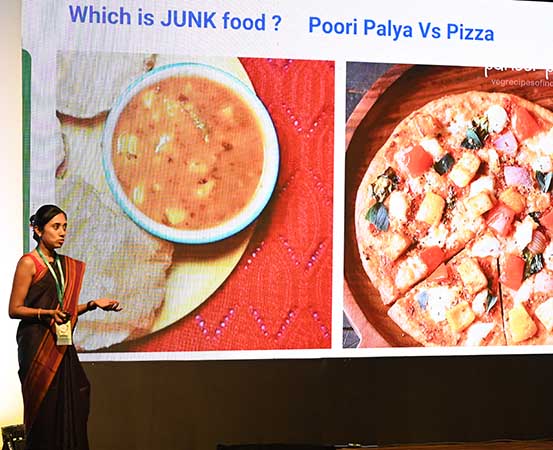
Putting together a healthy lunch box for children is one of the toughest tasks that parents face. The dilemma worsens when packing a snack that is not junk food. In such cases, knowing the nutritional values of food items can make the job easier. Cultivating healthy food habits in kids is vital to keep them away from junk foods, thereby enhancing their overall health, say experts.
Healthy foods for kids
Speaking about child nutrition at The Edge of Nutrition summit organised by Happiest Health, Dr Supraja Chandrasekar, director of pediatric services, senior pediatrician and intensivist at Dhee hospitals, Bengaluru, said, “It is important for parents to know what’s considered good food and what’s junk. Any food that contains protein, fibre, vitamins and minerals is good for children. On the contrary, foods containing excessive salt, sugar, preservatives and fats are considered junk. Choosing the right foods becomes easier if parents are aware of their nutritional values.”
Colour code of nutrition
A deficiency of nutrients like iron, vitamin D, vitamin B12, zinc and calcium is commonly seen in children, which leads to poor immunity and makes them susceptible to allergies, constipation and early puberty, said Dr Chandrasekar.
“All dark-coloured foods (especially green, red and brown) like legumes, meats and nuts are rich sources of iron, and children must be taught to choose such food items for optimal health,” she explained, adding that kids must avoid white-coloured foods like salt, sugar, maida and white rice.
In addition, the eating and playing habits of children are a major concern among parents, said Dr Chandrasekar. “The eating environment is crucial for developing healthy eating behaviours. A proper structure and a consistent routine have a significant impact on their well-being. Children should spend quality time with their families and nature, as increased screen time causes them to develop a lazy lifestyle and make poor food choices, which can lead to obesity,” she added.
Ideal platter for a child
Dr Chandrasekar emphasised the importance of giving children the right type of food in the right proportions to ensure they get the required nutrition. According to her, a balanced diet should contain:
- A quarter plate of whole grains and millets.
- A quarter plate of protein, like dhals, beans, soya, nuts, seeds, meat, egg, poultry and fish. It is best to opt for lean proteins.
- A quarter plate of vegetables, including all five types — green, starchy, red-orange, beans and others. These vegetables should be alternated regularly for children to receive all the micronutrients.
- A quarter plate of fruits. It is best to opt for whole fruits or smoothies rather than juices.
- One cup of any dairy product. Fresh, homemade items are ideal for optimal health.
She further explained that any food item (either Indian or Western) can be made into a healthy dish if it contains all the essential nutrients. “A homemade pizza with a whole grain crust and no preservatives is a healthier choice compared to poori and aloo which have a lower nutritional value,” she said.
Nutritional requirements of children
A child should have a diet that is varied and contains all colours of fruits and vegetables, said Dr Rebecca K Raj, professor & head, division of nutrition, St John’s Research Institute, Bengaluru. “Children must eat rainbow-coloured fruits and vegetables to get all the micronutrients. They should consume an adequate amount of protein and fat while avoiding excessive consumption of carbohydrates,” she added.
In addition, Dr Raj also emphasised that a child must have about two to three different fruits a day. “Similar to an adult, a child would require half a kilo of fruits and vegetables per day. It can be given throughout the day and doesn’t have to be limited to breakfast,” she said.
Dr Priyanka Rohatgi, chief dietician, Apollo Hospitals, Bengaluru, says that following the ‘53210′ principle ensures adequate nutrition and a healthy lifestyle. According to the concept, the daily routine of a child should include:
- 5 servings of fruits and vegetables.
- 3 balanced meals.
- Up to 2 hours of screen time.
- 1 hour of physical activity.
- 0 junk and HFSS (high in fat, salt and sugar) foods.

Cultivating healthy food habits in kids
It’s important to catch up to the growth spurt and hunger pangs of children, says Dr Rohatgi. “We as parents need to be role models and practice what we preach. We need to ensure that children consume healthy food which is tasty and satiating. Parents should not use food as a reward and ensure children have their meals on time,” she adds.
Speaking about eating at restaurants, Dr Rohatgi says portion control and an active lifestyle are important, cautioning that eating outside on a regular basis can cause obesity in children.
Takeaways
- Parents need to know the nutritional values of food items to provide the right nutrients to their children.
- Children must spend quality time with nature and their families, as increased screen time can cause them to make poor food choices, which can eventually lead to obesity.
- A child would require half a kilo of fruits and vegetables daily, which can be given throughout the day.
- Children must eat rainbow-coloured fruits and vegetables to get all the essential micronutrients from the diet.

















